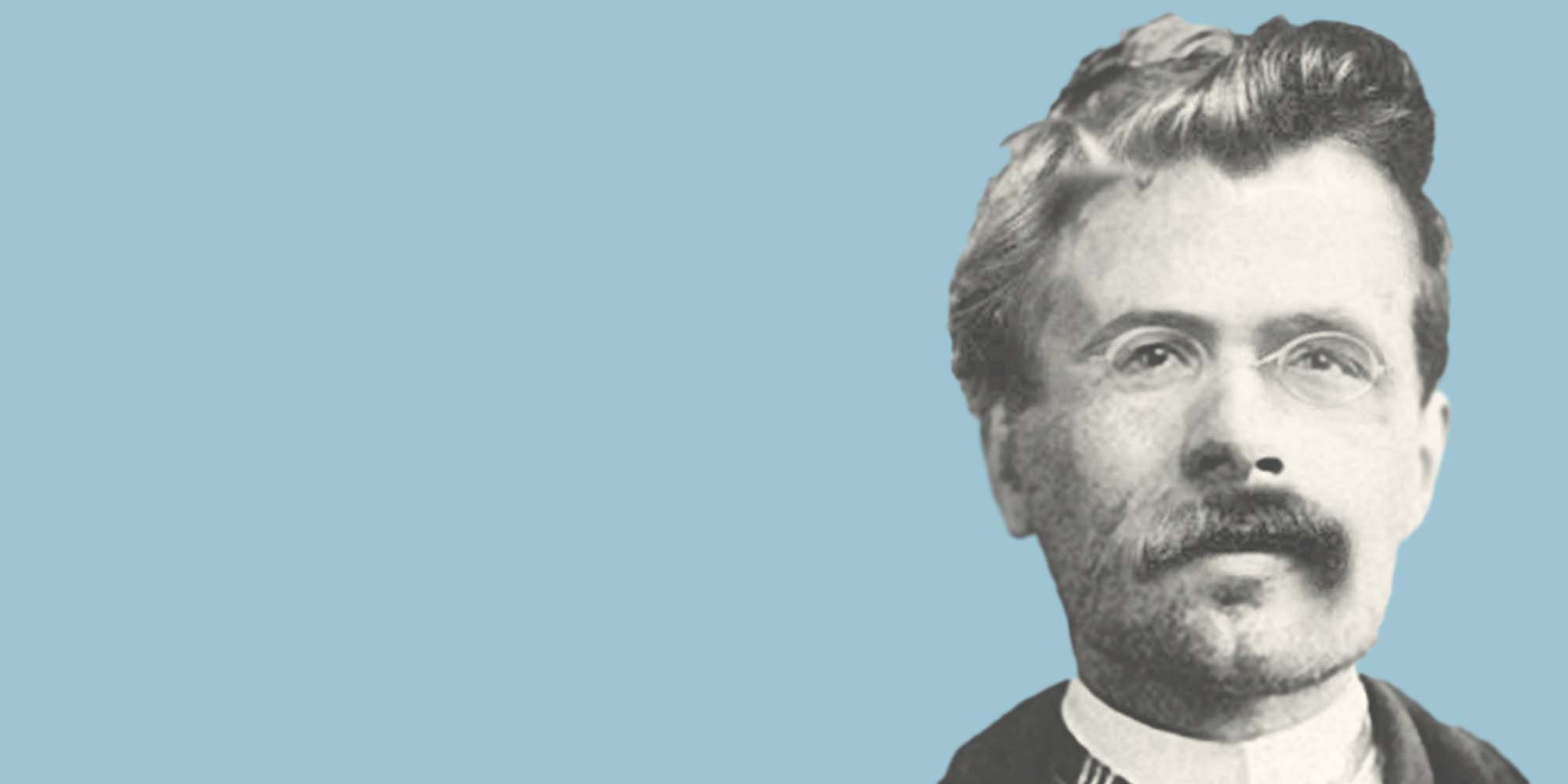Last Updated on February 25, 2024
Friedrich Nietzsche was one of the leading classicists of his generation. Known for his critical writings on religion and morality in modern society, the German philosopher exerted significant influence on future generations of writers and thinkers.
Today, Nietzsche is remembered for his thought-provoking statements and his profound contributions to Western philosophy.
Early Years
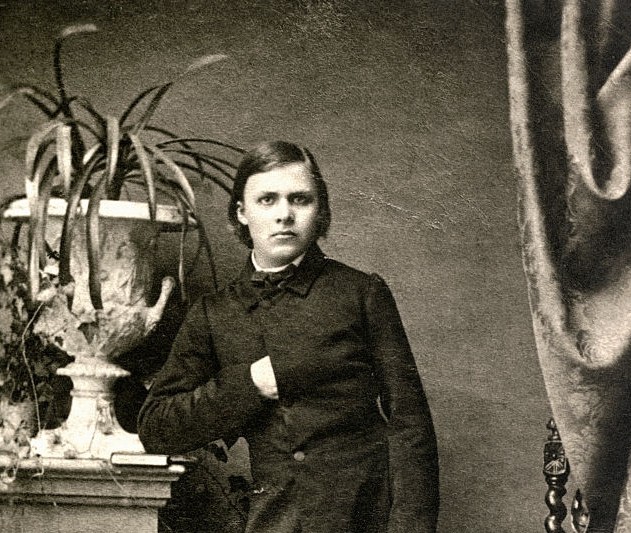
Born in Röcken bei Lützen, Germany, Nietzsche was named after the King of Prussia, Friedrich Wilhelm IV, who shared the same birthday. He was raised in a strict Protestant family.
His father was a preacher, while his grandfather authored books defending Lutheranism. At four years old, he witnessed his father’s year-long suffering from a brain disease that would eventually claim his life.
In 1849, he also went through the death of his two-year-old brother. Nietzsche and his sister were brought up by maternal figures. His mother, grandmother, and aunts all helped raise them.
Education
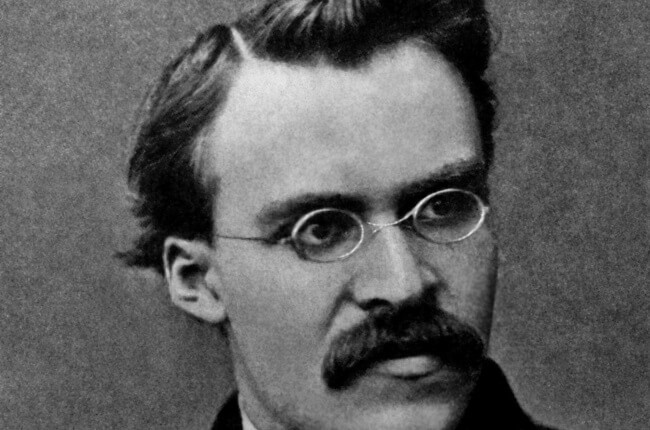
Nietzsche had seen so much death and suffering at a very young age. By the time he entered school, he was already quite a serious boy.
He suffered from a condition called myopia, which caused frequent headaches, so he had to wear glasses as a child. Not only did he act like a grown-up who had no time for childish games, but he also looked the part.
The renowned German philosopher went to a private Christian preparatory school. Later, he transferred to a prestigious boarding school where he would receive a classical education.
Nietzsche studied theology and philosophy at the University of Bonn in hopes of becoming a priest like his father. Just after two semesters, he quit upon realizing that his personal beliefs were widely different from the theological curriculum.
He transferred to the Universität Leipzig, where he studied linguistics, philosophy, and history.
When he was a student, Nietzsche contracted syphilis from a prostitute. A cure hadn’t been discovered in his lifetime, which meant he suffered a great deal of pain throughout his life. He also contracted dysentery and diphtheria when he volunteered at a hospital.
From then on, his health started to deteriorate, and he had to stay bedridden for several days. With nothing to do except ponder about the meaning of life and humanity, Nietzsche started writing his most notable works on philosophy.
Literary and Philosophical Works

In his mid-twenties, Nietzsche worked as a professor of classical philology at the University of Basel. His career in academics would be short-lived.
He moved to Sils Maria in the Swiss Alps. There, he lived a peaceful life as he wrote his masterpieces—The Birth of Tragedy, Human, All Too Human, and The Gay Science, among just a few.
Throughout the next decade, Nietzsche would mostly live in seclusion. He was in Switzerland, France, or Italy if he wasn’t in Naumburg, Germany. This was the most productive time of his life.
Some of his most influential works include Thus Spoke Zarathustra, which came out in four volumes from 1883 to 1885. He published Beyond Good and Evil in 1886 and The Genealogy of Morals in 1887. Meanwhile, Twilight of the Idols came out in 1889.
Nietzsche’s Philosophy
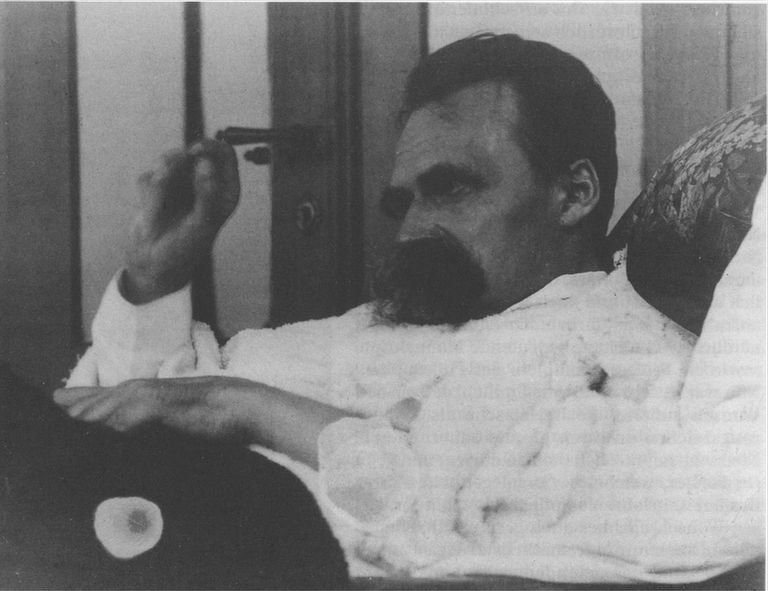
Nietzsche managed to establish the foundation of his philosophy in these works. For starters, he challenged the idea of a universal truth. He rejected the practice of placing blind faith in religion or in political leaders and encouraged people to inquire.
Many of his statements are popular to this day, but none of them is as famous as “God is dead.” Often, people use this quote without understanding the context behind it.
The statement shouldn’t be taken as is. Contrary to popular belief, Nietzsche wasn’t celebrating the death of the Christian god. He was referring to the decline of Christianity in his time.
As more and more people lost their faith, he suggested that Western civilization was slowly losing the foundation of morality. Without their religion telling them right from wrong, Nietzsche believed that people often turned to their political leaders to show them the way.
He knew that humans need something else to fill the void. For Nietzsche, the arts—music, theater, and literature—could take the place of religion.
Legacy
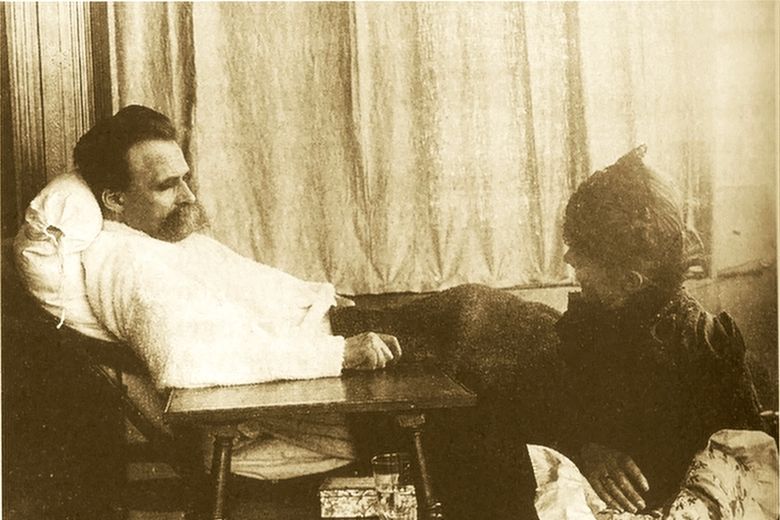
Unfortunately, many still misunderstand Nietzsche’s work to this day. The Nazi Party had quite a lot to do with that when they took certain aspects of his philosophy to justify the horrendous crimes they were doing. They did more to sully his name than any of the works he wrote.
In spite of this, Nietzsche has made profound contributions to philosophy, theology, and art, influencing great minds like Martin Heidegger, Michel Foucault, Carl Jung, and Jacques Derrida. Writers such as Albert Camus and Jean-Paul Sartre were also influenced by his writing.
Here are 101 of the best Friedrich Nietzsche quotes:
Friedrich Nietzsche Quotes
“There is always some madness in love. But there is also always some reason in madness.” – Friedrich Nietzsche
“He who cannot give anything away cannot feel anything either.” – Friedrich Nietzsche
“We love life, not because we are used to living but because we are used to loving.” – Friedrich Nietzsche
“When marrying, ask yourself this question: Do you believe that you will be able to converse well with this person into your old age? Everything else in marriage is transitory.” – Friedrich Nietzsche
“Thoughts are the shadows of our feelings – always darker, emptier and simpler.” – Friedrich Nietzsche
“In revenge and in love, woman is more barbarous than man.” – Friedrich Nietzsche
“Marriage: that I call the will of two to create the one who is more than those who created it.” – Friedrich Nietzsche
“Of all that is written, I love only what a person has written with his own blood.” – Friedrich Nietzsche
“It is not a lack of love, but a lack of friendship that makes unhappy marriages.” – Friedrich Nietzsche
“What else is love but understanding and rejoicing in the fact that another person lives acts and experiences otherwise than we do?” – Friedrich Nietzsche
“The man of knowledge must be able not only to love his enemies but also to hate his friends.” – Friedrich Nietzsche
“Love is not consolation. It is light.” – Friedrich Nietzsche
“A pair of powerful spectacles has sometimes sufficed to cure a person in love.” – Friedrich Nietzsche
“The demand to be loved is the greatest of all arrogant presumptions.” – Friedrich Nietzsche
“Whatever is done for love always occurs beyond good and evil.” – Friedrich Nietzsche
“Love is blind; friendship closes its eyes.” – Friedrich Nietzsche
“Not necessity, not desire – no, the love of power is the demon of men. Let them have everything – health, food, a place to live, entertainment – they are and remain unhappy and low-spirited: for the demon waits and waits and will be satisfied.” – Friedrich Nietzsche
“This is the hardest of all: to close the open hand out of love, and keep modest as a giver.” – Friedrich Nietzsche
“I love those who do not know how to live for today.” – Friedrich Nietzsche
“It is not when truth is dirty, but when it is shallow, that the lover of knowledge is reluctant to step into its waters.” – Friedrich Nietzsche
“Today I love myself as I love my god: who could charge me with a sin today? I know only sins against my god; but who knows my god?” – Friedrich Nietzsche
“God is dead. God remains dead. And we have killed him. Yet his shadow still looms. How shall we comfort ourselves, the murderers of all murderers? What was holiest and mightiest of all that the world has yet owned has bled to death under our knives; who will wipe this blood off us? What water is there for us to clean ourselves?” – Friedrich Nietzsche
“There cannot be a God because if there were one, I could not believe that I was not He.” – Friedrich Nietzsche
“I cannot believe in a God who wants to be praised all the time.” – Friedrich Nietzsche
“Woman was God’s second mistake.” – Friedrich Nietzsche
“That God became man indicates only this: that man should not seek his salvation in eternity, but rather establish his heaven on earth.” – Friedrich Nietzsche
“There is not enough love and goodness in the world to permit giving any of it away to imaginary beings.” – Friedrich Nietzsche
“Everything good is the transmutation of something evil: every god has a devil for a father.” – Friedrich Nietzsche
“In every ascetic morality man worships a part of himself as God and for that he needs to diabolize the other part.” – Friedrich Nietzsche
“A nation that still believes in itself holds fast to its own god.” – Friedrich Nietzsche
“There did he sit shrivelled in his chimney corner, fretting on account of his weak legs, world weary, will weary, and one day he suffocated through his excessive pity.” – Friedrich Nietzsche
“God is dead, but considering the state the species man is in, there will perhaps be caves, for ages yet, in which his shadow will be shown.” – Friedrich Nietzsche
“There is in general good reason to suppose that in several respects the gods could all benefit from instruction by us human beings. We humans are – more humane.” – Friedrich Nietzsche
“One of the most important aspects of Nietzsche’s work was his critique of truth as opposed to perspectivism. It is no surprise then that he has so many interesting quotes about the topic.” – Friedrich Nietzsche
“On the mountains of truth you can never climb in vain: either you will reach a point higher up today, or you will be training your powers so that you will be able to climb higher tomorrow.” – Friedrich Nietzsche
“There are no facts, only interpretations.” – Friedrich Nietzsche
“Sometimes people don’t want to hear the truth because they don’t want their illusions destroyed.” – Friedrich Nietzsche
“A thinker sees his own actions as experiments and questions–as attempts to find out something. Success and failure are for him answers above all.” – Friedrich Nietzsche
“Young people love what is interesting and odd, no matter how true or false it is. More mature minds love what is interesting and odd about truth. Fully mature intellects, finally, love truth, even when it appears plain and simple, boring to the ordinary person; for they have noticed that truth tends to reveal its highest wisdom in the guise of simplicity.” – Friedrich Nietzsche
“Art is not merely an imitation of the reality of nature, but in truth a metaphysical supplement to the reality of nature, placed alongside thereof for its conquest.” – Friedrich Nietzsche
“All things are subject to interpretation whichever interpretation prevails at a given time is a function of power and not truth.” – Friedrich Nietzsche
“We have art in order not to die of the truth.” – Friedrich Nietzsche
“The more abstract the truth you want to teach, the more thoroughly you must seduce the senses to accept it.” – Friedrich Nietzsche
“There are no eternal facts, as there are no absolute truths.” – Friedrich Nietzsche
“Belief in the truth commences with the doubting of all those “truths” we once believed.” – Friedrich Nietzsche
“Faith: not wanting to know what the truth is.” – Friedrich Nietzsche
“In truth, there was only one christian and he died on the cross.” – Friedrich Nietzsche
“All things are subject to interpretation. Whichever interpretation prevails at a given time is a function of power and not truth.” – Friedrich Nietzsche
“The Christian resolution to find the world ugly and bad has made the world ugly and bad.” – Friedrich Nietzsche
“In heaven, all the interesting people are missing.” – Friedrich Nietzsche
“I cannot believe in a God who wants to be praised all the time.” – Friedrich Nietzsche
“In short, then, the religious cult is based upon the representations of sorcery between man and man, and the sorcerer is older than the priest.” – Friedrich Nietzsche
“Without music, life would be a mistake.” – Friedrich Nietzsche
“And those who were seen dancing were thought to be insane by those who could not hear the music.” – Friedrich Nietzsche
“We should consider every day lost on which we have not danced at least once.” – Friedrich Nietzsche
“Without music, life would be a mistake… I would only believe in a God who knew how to dance.” – Friedrich Nietzsche
“In music the passions enjoy themselves.” – Friedrich Nietzsche
“Only sick music makes money today.” – Friedrich Nietzsche
“Without music, life would be an error. The German imagines even God singing songs.” – Friedrich Nietzsche
“The overman…Who has organized the chaos of his passions, given style to his character, and become creative. Aware of life’s terrors, he affirms life without resentment.” – Friedrich Nietzsche
“…throw roses into the abyss and say: ‘here is my thanks to the monster who didn’t succeed in swallowing me alive.” – Friedrich Nietzsche
“The world itself is the will to power – and nothing else! And you yourself are the will to power – and nothing else!” – Friedrich Nietzsche
“I assess the power of a will by how much resistance, pain, torture it endures and knows how to turn to its advantage.” – Friedrich Nietzsche
“The architect represents neither a Dionysian nor an Apollinian condition: here it is the mighty act of will, the will which moves mountains, the intoxication of the strong will, which demands artistic expression. The most powerful men have always inspired the architects; the architect has always been influenced by power.” – Friedrich Nietzsche
“What is evil?-Whatever springs from weakness.” – Friedrich Nietzsche
“No power can be maintained when it is only represented by hypocrites.” – Friedrich Nietzsche
“Men submit from habit to everything that seeks power.” – Friedrich Nietzsche
“Be generous in nature and thought; for this wins respect and gives confidence and power.” – Friedrich Nietzsche
“Life is an instinct for growth, for survival, for the accumulation of forces, for power.” – Friedrich Nietzsche
“Reckoned physiologically, everything ugly weakens and afflicts man. It recalls decay, danger, impotence; he actually suffers a loss of energy in its presence. The effect of the ugly can be measured with a dynamometer. Whenever man feels in any way depressed, he senses the proximity of something ugly. His feeling of power, his will to power, his courage, his pride – they decline with the ugly, they increase with the beautiful.” – Friedrich Nietzsche
“Distrust all in whom the impulse to punish is powerful.” – Friedrich Nietzsche
“Art is the proper task of life.” – Friedrich Nietzsche
“The essence of all beautiful art, all great art, is gratitude.” – Friedrich Nietzsche
“Sleeping is no mean art: for its sake one must stay awake all day.” – Friedrich Nietzsche
“An artist has no home in Europe except in Paris.” – Friedrich Nietzsche
“Art is essentially the affirmation, the blessing, and the deification of existence.” – Friedrich Nietzsche
“There is one thing one has to have either a soul that is cheerful by nature, or a soul made cheerful by work, love, art, and knowledge….” – Friedrich Nietzsche
“I do not know what the spirit of a philosopher could more wish to be than a good dancer. For the dance is his ideal, also his fine art, finally also the only kind of piety he knows, his ‘divine service.’” – Friedrich Nietzsche
“Man is the cruelest animal. At tragedies, bullfights, and crucifixions he has so far felt best on earth; and when he invented hell for himself, behold, that was his very heaven.” – Friedrich Nietzsche
“One must give value to their existence by behaving as if ones very existence were a work of art.” – Friedrich Nietzsche
“The bad gains respect through imitation, the good loses it especially in art.” – Friedrich Nietzsche
“Admiration for a quality or an art can be so strong that it deters us from striving to possess it.” – Friedrich Nietzsche
“We shall do a great deal for the science of esthetics, once we perceive not merely by logical inference, but with the immediate certainty of intuition, that the continuous development of art is bound up with the Apollonian and Dionysian duality: just as procreation depends on the duality of the sexes, involving perpetual strife with only periodically intervening reconciliations.” – Friedrich Nietzsche
“Hope in reality is the worst of all evils because it prolongs the torments of man.” – Friedrich Nietzsche
“Is it better to out-monster the monster or to be quietly devoured?” – Friedrich Nietzsche
“Whatever is done for love always occurs beyond good and evil.” – Friedrich Nietzsche
“If you have an enemy, do not requite him evil with good, for that would put him to shame. Rather prove that he did you some good.” – Friedrich Nietzsche
“There is an old illusion. It is called good and evil.” – Friedrich Nietzsche
“If you are too weak to give yourselves your own law, then a tyrant shall lay his yoke upon you and say: “Obey! Clench your teeth and obey!” – Friedrich Nietzsche
“And all good and evil shall be drowned in obedience to him.” – Friedrich Nietzsche
“But it is the same with man as with the tree. The more he seeks to rise into the height and light, the more vigorously do his roots struggle earthword, downword, into the dark, the deep – into evil.” – Friedrich Nietzsche
“Of all evil I deem you capable: Therefore I want good from you. Verily, I have often laughed at the weaklings who thought themselves good because they had no claws.” – Friedrich Nietzsche
“What we experience in dreams – assuming that we experience it often – belongs in the end just as much to the over-all economy of our soul as anything experienced “actually”: we are richer or poorer on account of it.” – Friedrich Nietzsche
“Everything good is the transmutation of something evil: every god has a devil for a father.” – Friedrich Nietzsche
“He who fights with monsters should look to it that he himself does not become a monster. And when you gaze long into an abyss the abyss also gazes into you.” – Friedrich Nietzsche
“[Anything which] is a living and not a dying body… will have to be an incarnate will to power, it will strive to grow, spread, seize, become predominant – not from any morality or immorality but because it is living and because life simply is will to power… ‘Exploitation’… belongs to the essence of what lives, as a basic organic function; it is a consequence of the will to power, which is after all the will to life.” – Friedrich Nietzsche
“Digressions, objections, delight in mockery, carefree mistrust are signs of health; everything unconditional belongs in pathology.” – Friedrich Nietzsche
“Poets are shameless with their experiences: they exploit them.” – Friedrich Nietzsche
“He who fights with monsters might take care lest he thereby become a monster. And if you gaze for long into an abyss, the abyss gazes also into you.” – Friedrich Nietzsche
“What is done out of love always takes place beyond good and evil.” – Friedrich Nietzsche
“The great epochs of our life come when we gain the courage to rechristen our evil as what is best in us.” – Friedrich Nietzsche

